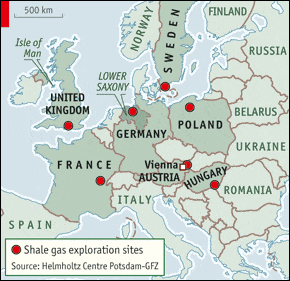A German member in the European parliament (MEP) is proposing a straightforward way to prevent (or outlaw) exploration and drilling for unconventional gas in the European Union (EU). His plan, bypass national strife and instead build consensus for a European-wide ban.
Jo Leinen, chair of the committee on the environment, public health and food safety, is considered one of the most influential MEP’s. He recently told The Guardian that he wants to work on a new energy quality directive that is expected to focus on penalizing and/or banning the extraction, import and use of fuels which are environmentally destructive – namely unconventional gas and even tar sands oil.
While some consider unconventional gas as a clean burning source of fuel, each day seems to bring more and more bad news about its damaging health and environmental effects.
What’s more, the International Energy Agency has found that gas reliance would be disastrous for fighting climate change. This is supported by recent findings from Cornell University which show that over a 20-year period, unconventional gas emissions are at least 20% greater than coal, and maybe as high as 50%.
At the national level, efforts to regulate the unconventional gas industry in Europe have been a mix of success and failure.
France just banned hydraulic fracturing (a.k.a. fracking), passing both the lower and upper houses of the French National Assembly. While this is a success, a full ban on unconventional gas was viewed as too prohibitive by the governing UMP party and subsequently dropped from consideration before it ever came to a vote.
In Britain, the debate around unconventional gas rages on. Huw Irranca-Davies, the Labour party’s shadow energy minister recently wrote to energy minister Charles Hendry urging him to temporarily ban gas drilling and fracking, at least until the technology and its impacts can be studied [pdf] further.
At the moment, drilling supporters in parliament outnumber detractors. The parliamentary committee on energy and climate change just rejected any possibility of a moratorium on unconventional gas. The committee stated: “We conclude that, on balance, a moratorium in the UK is not justified or necessary at present.” Tax breaks to encourage drilling are still being considered.
Unfortunately, in other countries like Poland, the unconventional gas “barometer of Europe,” drilling is advancing at an “unprecedented speed.” At present, Polish leaders are touting unconventional gas as a pan-European project.
Jesse Scott, program leader with E3G, a British NGO promoting sustainable development, said the portrayal of unconventional gas as the “European solution” is a battle yet to be won.
This fight will soon be waged in Germany, where diversifying sources of energy has become especially important, since parliamentarians recently voted to end the use of nuclear energy by 2022. Without nuclear, Germany will rely more and more on alternative energy options like hydropower, wind and solar, which it already wants to grow to at least 35% by 2020.
With many countries in Europe either reluctant to ban unconventional gas drilling or ready to push ahead with it – and with unconventional gas drillers trying to label their fossil fuel as a green energy source – Leinen’s proposed energy directive faces an uphill struggle. But it may encounter success at the European level where MEPs previously passed Europe’s “20-20-20” targets (20% less carbon emissions and 20% of energy production from renewables by 2020).
Photo Credit: The Economist
Subscribe to our newsletter
Stay up to date with DeSmog news and alerts






